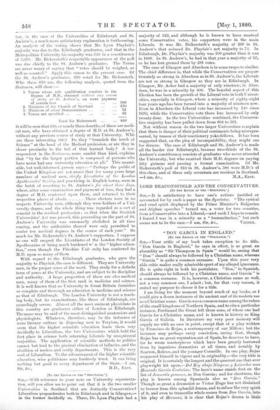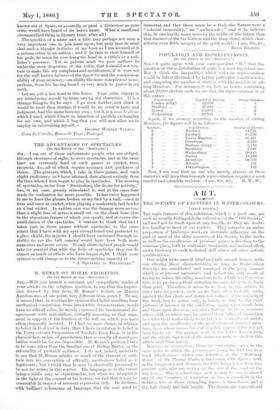"DON GARCIA IN ENGLAND."
(To THE EDITOR OF THE "SPECTATOR.")
Star—Your critic of my book takes exception to its title. "Don Garcia in England," he says in effect, is as great an absurdity as "Sir Thompson in Spain" would be, seeing that " Don " should always be followed by a Christian name, whereas " Garcia " is quite a common surname. Upon this your very able critic makes really admirable sport of my alleged ignorance. He is quite right in both his postulates. "Don," in Spanish, should always be followed by a Christian name, and Garcia" is a common surname. It is, however, a Christian name as well, not a very common one, I admit ; but, for that very reason, it suited my purpose to choose it for a title.
I am living for the moment beyond reach of my books, or I could give a dozen instances of its ancient and of its modern use- as a Christian name. G arciawas a common name among the rulers of the small kingdoms of Northern Spain, and to cite a particular instance, Ferdinand the Great left three sons, of whom one had Garcia for a Christian name, and is known in history as King Garcia of Galicia. In literature my very poor memory will supply me with no case in point, except that of a play written by Francisco de Rojas, a contemporary of our Milton ; but the instance may perhaps carry conviction, seeing that, though Rojas has no great reputation out of Spain, he deserves to have, for he wrote masterpieces which have been greatly borrowed from by ingenious dramatists at all times, and notably by Scarron, Rotrou, and the younger Corneille. In one play, Rojas surpassed himself in vigour and in originality,—the very title is original. It is certainly the longest and the queerest one that ever playwright hit upon,—Del Rey abajo Ninguno y Labrador mas Honrado Garcia Castaiiar. The hero's name stands first on the list of dramatis personce, as Don Garcia ; and for shortness, the play is known among Spaniards also as "Does Garcia." Though so great a dramatist as Victor Hugo has not disdained to borrow from this splendid drama, and to infuse the very spirit of it, and even to transcribe whole scenes from Don Garcia, into his play of Hernani, it is clear that Rojas's drama is little-
known out of Spain, or assuredly so good a littirateur as your -critic would have heard of its hero's name. What a small and • circumscribed thing is literary fame, after all !
The question of a name and a title may perhaps not seem a very important one to join issue upon, but pray bear in mind that such a blunder in limine of my book as I am accused of is a serious crime in an author ; and if he fails to clear himself of his guilt, he must for ever hang the head in a critic's or a pub- lisher's presence. Yet so patient must we poor authors be under the stern despotism of the critic, that I should not ven- ture to make this my complaint and rectification, if it were not for the well known fairness of the Spectator and the conspicuous ability of your review er,—an ability the more conspicuous to me, perhaps, from his having found so very much to praise in my work.
Let me add a last word to this letter. Your critic objects to my introducing myself by name among my characters. It is a strange thing to do, he says. I go even further, and think it would be more than strange, it would be an error in taste and judgment, had the name been my own ; but it is a nom. de phone which I used, which I have no intention of publicly exchanging for my own, and which I beg that you will now allow me to employ in subscribing myself,—
GEORGE WINDLE S.ANDYS.
Casa do Cattalo, Rana de Troia, Portugal.



































 Previous page
Previous page